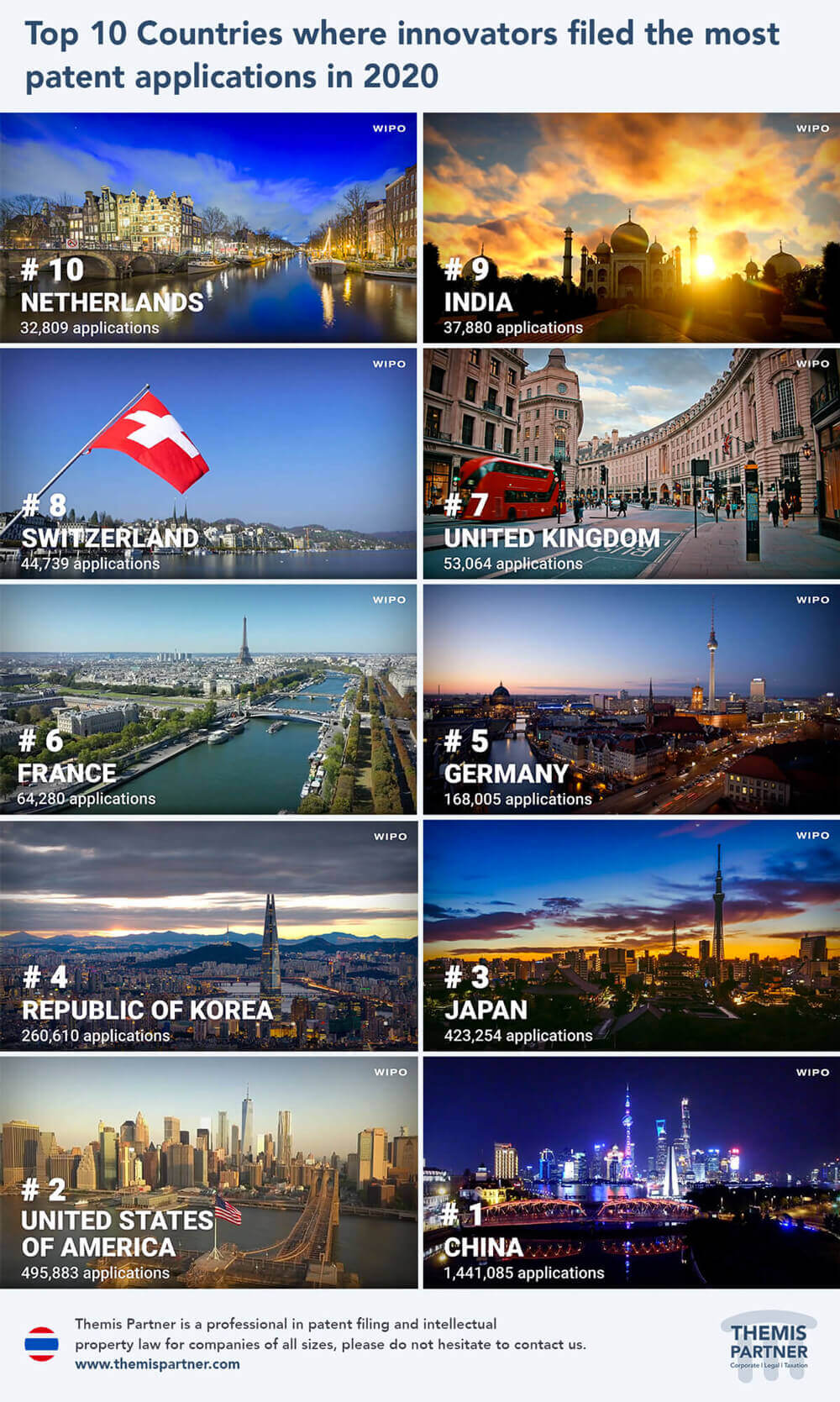Home › Intellectual property › Patent
Learn more about Patent
Thailand has multiple bilateral agreements with other countries allowing foreigners to file patents in Thailand. A patent can be defined as an industrial property title that gives the company that owns it a right to exploit, but more importantly a right to prohibit any other entity from exploiting the same patent. It is an exclusive title to an invention, granted to a person or company. It protects an invention against reproduction and exploitation of the design without its author. To exploit a new process or device, a patent must be accompanied by a right of exploitation. It supports innovative companies by protecting their advances, even if the validity is limited in time.
Table of contents
Why file a patent in Thailand?
Patenting is essential to preserve and protect an invention which gives the applicant the power to use their creation. Once a patent is filed, the applicant becomes the owner of the patent and has the right to use it for a limited period. Filing a patent confers the following benefits on the applicant:
- The exploitation of the patent for a limited period
- Operating monopoly for a limited period
- Request restriction and prohibition of any exploitation of his patent without his consent
- Right to proceed with the appropriate legal action in connection with the act of using his patent without his permission
- Claim damages before the competent court
Foreign investors doing business in developing countries such as Thailand often bring proprietary technologies that they want to protect, maintain their competitive advantage and get a return on their investment in research and development.
Patent rights allow innovations to be protected for a limited period of time. Therefore, a patent consists of exclusive rights granted to the inventor for a limited period of time in exchange for the end of exploitation, disclosure and use of the patent by the general public. In general, the application must include a description of the invention and one or more claims that define the invention.
Following the first fall in a decade in 2019, global patent filing activity increased in 2020, owing to a decline in China. China’s Intellectual Property Office reported another year of growth in 2020, with 1.5 million patent applications. This was 2.5 times greater than the patent office in the second most populous country, the United States (USPTO; 597,172). Japan (JPO; 288,472), the Republic of Korea (KIPO; 226,759), and the European Patent Office followed the United States (EPO; 180,346). These five offices accounted for 85.1 percent of the total worldwide.
Only three of the top ten offices – China (+6.9%), India (+5.9%), and the Republic of Korea (+3.6%) – witnessed an increase in applications in 2020, while Germany (–7.9%) and Japan (–6.3%) saw substantial losses.
Among the top ten offices were Germany (62,105), India (56,771), the Russian Federation (34,984), Canada (34,565), and Australia (29,294).

Due to long-term expansion in China as well as growing IP activity in other parts of Asia, Asian offices received two-thirds (66.6 percent) of all applications filed worldwide in 2020, up from 51.5 percent in 2010. North American offices accounted for nearly one-fifth (19.3%) of the global total, while European offices accounted for slightly over one-tenth (10.9 percent ). In 2020, Africa, Latin America and the Caribbean, and Oceania had a combined share of 3.2 percent of all workplaces. Around five out of ten IP applications were in Asia a decade ago; last year, the number reached close to seven out of ten IP applications.
In terms of filings outside of the United States, U.S.-based applicants filed the most similar applications abroad (226,297) in 2020, followed by Japan (195,906), Germany (99,791), China (96,268), and the Republic of Korea (96,268). (80,133).
In 2020, the number of active patents will have increased by 5.9% to roughly 15.9 million. The United States has the most patents in force (3.3 million), followed by China (3.1 million), Japan (2 million), the Republic of Korea (1.1 million), and Germany (1.1 million) (0.8 million).
China had the highest growth rate in patents in force in 2020 (+14.5%), followed by Germany (+8.1%), the United States (+6.9%), and the Republic of Korea (+4.6%). In 2020, Japan reported a minor drop (0.7 percent).
Computer technology was the most frequently featured technology in published patent applications worldwide in 2019 (the latest year for which complete data is available due to the delay between confidential application and publication), with 284,146 published applications, followed by electrical machinery (210,429), measurement (182,612), digital communication (155,011), and medical technology (154,706).
What are the different patents?
Thai law protects 3 types of patents which are:
| ➤ Patents for new products or processes benefiting from a period of protection of 20 years (non-renewable) |
| ➤ Minor patents for new insignificant inventions benefiting from 10 years of protection (non-renewable) |
| ➤ The patents on the model concern the aesthetic aspect of the shape, configuration or a model benefiting from the protection of 10 years (non-renewable) |




